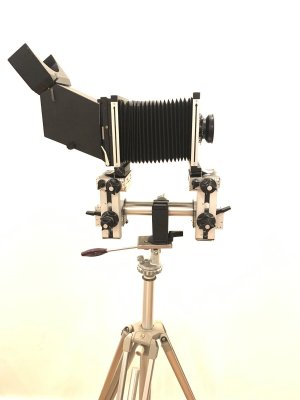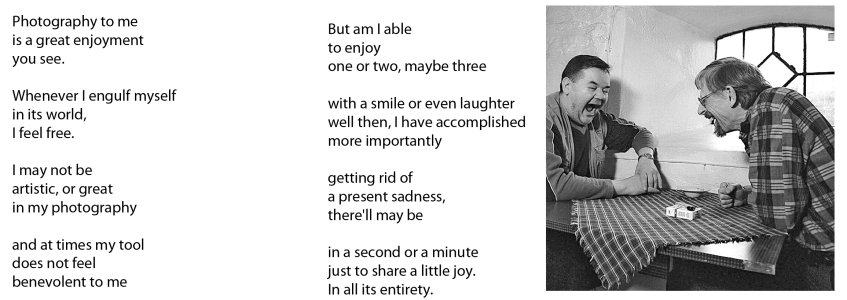Stephane Tougard
Well-Known Member
Since the forum is called "Real Photographer Forum", it should trigger a discussion about how we should define a real photographer. Those past few weeks, I had a strong review of my own opinion about this when I watched some old photos I've made in the past with a Voigtlander Bessa R2 (a film camera).
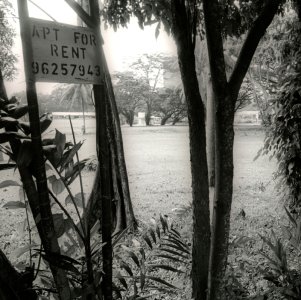
Don't get me wrong here, I don't say that my photo at that time were better than all the photographs I've made since this time. In fact, I've made much better than that since I've owned the Bessa. But I've become a mediocre photographer if my photographs were better. I confused the travel with the destination, I believed that the destination was more important than the travel, that making good photographs was better than being a good photographer.

The first photograph is made with a Voigtlander Bessa R2 and I don't even remember which lens I used at the time. It's not what I would consider a good shot, but back then I still decided to keep it and I think I was right. The second one has been made recently with a Nikon Zfc and the 16-50. It shows a small street of Bangkok half flooded and a woman trying to make her way without ruining her shoos.
Both images have no relationship whatsoever, but the second one is definitely better. Technically, it's colorful, it's all in focus, there is a clear context and an information. Taken from below, not being exceptional, the composition is still OK and fits the purpose. But I get no honor here, the camera has done everything for me, I just had to get there and press the shutter at the right point. I would never have been able to catch this shot with a Bessa R2 today because there are too many parameters I would have to handle to be ready in time.
I've seen professionals cover an event with some Nikon Z9 (or equivalent) without even watching what they were shooting. Holding the camera above their head and shooting continuously hundreds of photographs per minutes in every direction. In post processing, they will just delete 99.9% of what they shoot, post-process whatever remains in Capture one (or whatever software you may name here) and still come with a reasonable result, maybe even better than whatever I can do with the very same Bessa R2 I was talking about.
Is that being a good photographer ?
For years, I've been cheating this way. I've been using the Nikon D1h and D1x, the D700 (what a wonderful camera) and I've shot hundreds of photographs per hours in the streets of wherever I was living at the time.
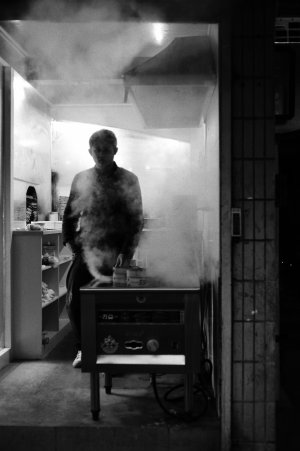
But I was cheating. I was just shooting RAW files, then I post processed them to get exactly the kind of result I wanted. I consider today that's not being a real photographer. I got very good photographs, but it's easy to get photographs when the only thing I have to do is to shoot 300 hundreds photographs in two hours, select the 2 or 3 a little bit better and post process them to get a kind of film feeling and give myself some compliments: "it looks like Cartier Bresson, I'm so proud of my work".
But Cartier Bresson did not have a Nikon D700, he had a Leica M3 and one lens to work.
My view changed when I acquired a Leica M9. This camera is not like the ones I owned so far. I does not shoot 300 photographs per hour, it does not focus for me, its light meter mesures the light as it arrives on the shutter, as we did for years before the AI was included in every camera to handle every and each case. The framing is approximative, on my camera, even the focus is screwed and I have to correct each photo manually. And I have to consider all those parameters and imperfections while I'm making the photograph, not during the post processing. The camera is so slow (1 shot per second at best), there is no second chance. I get the shot or I miss it. But there is no before and no after, just the right moment, the one opportunity for me to get.
And to make matter worse, the DNG are less good than the JPG out of the camera (let's say that the JPG are really super good). So bye bye post processing, get back the shadow or the burnt area. If the shot is not good out of the camera, It's not good at all.

All this is very frustrating, to say the least. The overall quality of my work has decreased significantly since I do not post process my photographs anymore, since I don't cheat anymore. I miss many opportunities and shots when I walk in the street. I've to see things in advance and get prepared if I want the shot ... in other words, I've become a better photographer, a real photographer.

Don't get me wrong here, I don't say that my photo at that time were better than all the photographs I've made since this time. In fact, I've made much better than that since I've owned the Bessa. But I've become a mediocre photographer if my photographs were better. I confused the travel with the destination, I believed that the destination was more important than the travel, that making good photographs was better than being a good photographer.

The first photograph is made with a Voigtlander Bessa R2 and I don't even remember which lens I used at the time. It's not what I would consider a good shot, but back then I still decided to keep it and I think I was right. The second one has been made recently with a Nikon Zfc and the 16-50. It shows a small street of Bangkok half flooded and a woman trying to make her way without ruining her shoos.
Both images have no relationship whatsoever, but the second one is definitely better. Technically, it's colorful, it's all in focus, there is a clear context and an information. Taken from below, not being exceptional, the composition is still OK and fits the purpose. But I get no honor here, the camera has done everything for me, I just had to get there and press the shutter at the right point. I would never have been able to catch this shot with a Bessa R2 today because there are too many parameters I would have to handle to be ready in time.
I've seen professionals cover an event with some Nikon Z9 (or equivalent) without even watching what they were shooting. Holding the camera above their head and shooting continuously hundreds of photographs per minutes in every direction. In post processing, they will just delete 99.9% of what they shoot, post-process whatever remains in Capture one (or whatever software you may name here) and still come with a reasonable result, maybe even better than whatever I can do with the very same Bessa R2 I was talking about.
Is that being a good photographer ?
For years, I've been cheating this way. I've been using the Nikon D1h and D1x, the D700 (what a wonderful camera) and I've shot hundreds of photographs per hours in the streets of wherever I was living at the time.

But I was cheating. I was just shooting RAW files, then I post processed them to get exactly the kind of result I wanted. I consider today that's not being a real photographer. I got very good photographs, but it's easy to get photographs when the only thing I have to do is to shoot 300 hundreds photographs in two hours, select the 2 or 3 a little bit better and post process them to get a kind of film feeling and give myself some compliments: "it looks like Cartier Bresson, I'm so proud of my work".
But Cartier Bresson did not have a Nikon D700, he had a Leica M3 and one lens to work.
My view changed when I acquired a Leica M9. This camera is not like the ones I owned so far. I does not shoot 300 photographs per hour, it does not focus for me, its light meter mesures the light as it arrives on the shutter, as we did for years before the AI was included in every camera to handle every and each case. The framing is approximative, on my camera, even the focus is screwed and I have to correct each photo manually. And I have to consider all those parameters and imperfections while I'm making the photograph, not during the post processing. The camera is so slow (1 shot per second at best), there is no second chance. I get the shot or I miss it. But there is no before and no after, just the right moment, the one opportunity for me to get.
And to make matter worse, the DNG are less good than the JPG out of the camera (let's say that the JPG are really super good). So bye bye post processing, get back the shadow or the burnt area. If the shot is not good out of the camera, It's not good at all.

All this is very frustrating, to say the least. The overall quality of my work has decreased significantly since I do not post process my photographs anymore, since I don't cheat anymore. I miss many opportunities and shots when I walk in the street. I've to see things in advance and get prepared if I want the shot ... in other words, I've become a better photographer, a real photographer.
Last edited:
